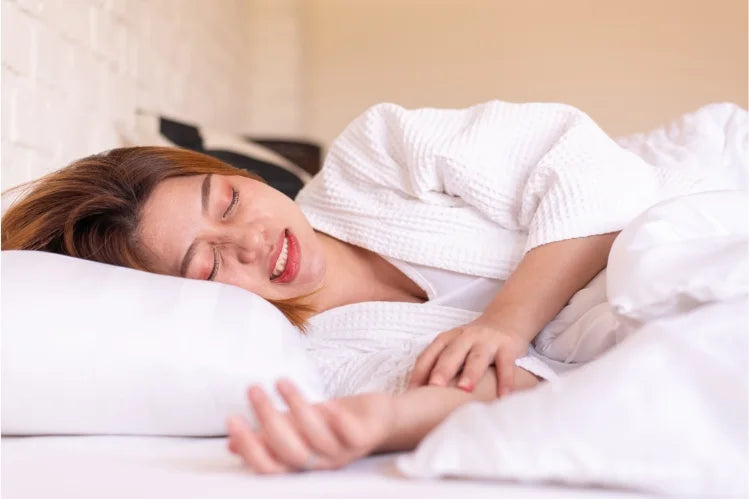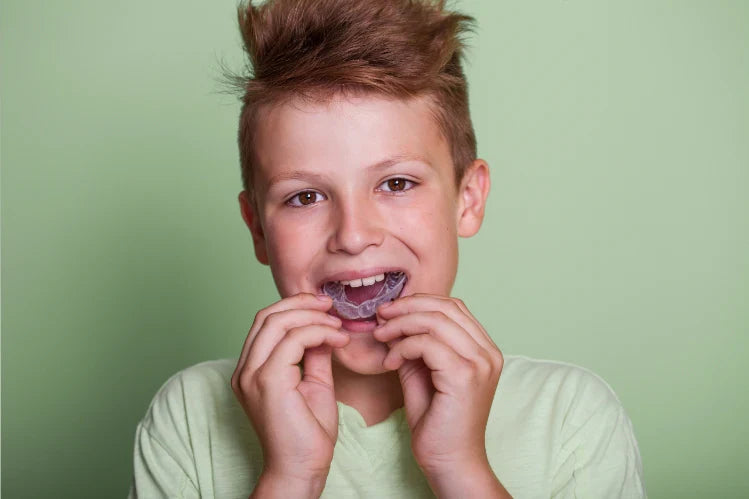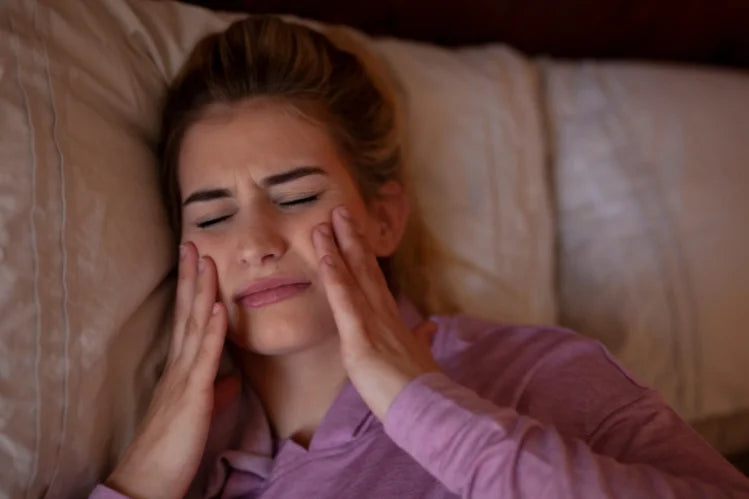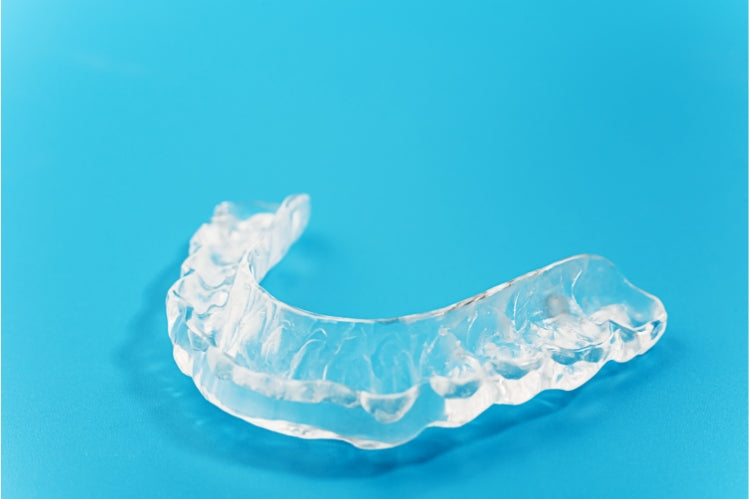
Table of Contents
- Understanding Teeth Grinding
- Causes of Teeth Grinding
- Common Complications Associated With Teeth Grinding
- Dental Concerns
- Jaw and Facial Problems
- Ear and Sinus Problems
- Sleep Disruptions
- Psychological and Stress-related Issues
- Natural Remedies to Stop Teeth Grinding
- Jaw and Facial Excercise
- Hot Towel Compress
- Relaxation Techniques
- Stay Hydrated
- Dietary Habits
- Herbal and Natural Supplements
- Sleep Hygiene Improvements
- Medicines That Can Help
- Orthodontic Treatments for Teeth Grinding
- ALIGNERCO: Your Ultimate Savior
- Recap
- FAQs
Are you experiencing a sore jaw and sensitive teeth when you wake up? Do you feel like your teeth had a wrestling match at night and wonder why you wake up like this daily? The answer is that you might be grinding your teeth at night unintentionally. You are not alone. Teeth grinding, or bruxism is one of those sneaky habits most people don’t even realize they have—until the damage is done.
This article will deeply explore the causes of teeth grinding and suggest some ways that will help you stop this habit.
Understanding Teeth Grinding
Teeth grinding, also known as bruxism, is a condition in which a person involuntarily grinds clenches, or gnashes their teeth. Teeth grinding during sleep generally goes unnoticed until the patient develops symptoms, or visits a dentist, who diagnoses other problems that have already been caused by teeth grinding.
Types of Teeth Grinding
Grinding of teeth or bruxism can occur when a person is asleep or awake. The grinding action is the same, but the conditions are different.
Awake Bruxism
Awake bruxism means grinding your teeth during waking hours. You might not need treatment for awake bruxism if you can find ways to increase your awareness regarding and reduce stress.
Sleep Bruxism
Sleep bruxism refers to teeth grinding when you are asleep. This can cause more harm to your well-being than awake bruxism because you don't realize it happening. People with sleep bruxism might need varied treatments to overcome the habit and the impacts it causes.
Symptoms of Teeth Grinding
Given below are some of the symptoms that might indicate you are grinding your teeth at night.
- Headaches
- Facial pain
- Earaches
- Sore jaw
- Tinnitus
- Pain when you eat
- Difficulty while opening and closing your mouth
- Chipped or cracked teeth
- Dislocation or locking of jaw
- Wear facets
- Damage to the inside of the mouth
- Scalloped tongue
- A pain or clicking in TMJ
- Disturbed sleep
Causes of Teeth Grinding
Teeth grinding can be caused by various factors ranging from psychological stress to physical conditions. Here are the most common causes:
Stress and Anxiety
Feeling overwhelmed and stressed out can sometimes cost you more than your mental health. Emotional stress, anxiety, and tension can cause involuntary teeth grinding. Most people under high stress usually unconsciously or involuntarily grind their teeth or clench their jaws even when sleeping. If you have MDD or GAD, you are more prone to bruxism.
Sleep Disorders
Bruxism or teeth grinding is often associated with sleep apnea, snoring, and other sleep disturbances. Studies have established a link between sleep apnea and bruxism, but it has yet to be proven whether sleep apnea is a contributing factor to bruxism or vice versa. Moreover, people with restless leg syndrome (RLS) or other sleep disorders are more likely to grind their teeth.
Lifestyle Habits
Bad lifestyle habits like smoking, high caffeine or alcohol intake, taking certain recreational drugs like cocaine or ecstasy, or consuming tea or coffee more, especially before bedtime increase jaw activity and hence, the risk of teeth grinding.
Certain Medications
Some medications like selective serotonin reuptake inhibitors (SSRIs) or other antidepressants are known to cause teeth grinding as a side effect.
Medical Conditions
Certain Neurological conditions such as Parkinson’s disease or Huntington’s disease can lead to involuntary jaw movements, leading to bruxism.
Genetics
Like any other trait, teeth grinding can run in families, which means if your parents, siblings, or any close relative grind their teeth, you may be more likely to grind your teeth as well.
Common Complications Associated With Teeth Grinding

Unattended teeth grinding can lead to multiple health complications.
Dental Concerns
Grinding teeth may cause damage to the enamel and gums, which could lead to an increased tendency for tooth fractures, chipping, or cracking. Once the tooth enamel erodes, the tooth becomes increasingly sensitive to hot, cold, or sweet food items. Moreover, one may loosen teeth with the continued pressure applied to them. Also, there is a possibility of breaking down crowns or even veneers.
Jaw and Facial Problems
Grinding causes jaw soreness or discomfort because of the unusual use of jaw muscle. Chronic bruxism can also cause TMJ disorders. Moreover, it can also lead to pain, clicking sounds, and difficulty in chewing and opening and closing of mouth.
Ear and Sinus Problems
Although teeth grinding or jaw clenching usually don't harm the ears, they can tense up the area around the ears and cause pain. Some individuals may experience buzzing or ringing sounds as a result of strained jaw and facial muscles.
Sleep Disruptions
Teeth grinding is frequently linked to sleep disorders, such as those characterized by disturbed breathing through the airways, sleep apnea, or snoring. It disrupts the sleep and affects the breathing and overall bad sleep quality.
Psychological and Stress-related Issues
Grinding teeth often causes psychological issues. it can heighten stress levels and create a vicious cycle of further grinding. Sleep deprivation arising from teeth grinding can bring on irritability, fatigue, and, in some instances, difficulty in concentration.
Natural Remedies to Stop Teeth Grinding

Multiple home-based remedies are practiced worldwide to stop teeth grinding. Have a look at some of them below:
Jaw and Facial Excercise
Exercise can help strengthen the muscles in the jaw and reduce the likelihood of teeth grinding. Gently massage the jaw muscles to relax them. Practice tongue posture techniques and strengthening exercises to relieve jaw tension.
Hot Towel Compress
Adding heat to the painful sides of the jaw can actually help reduce the pain. It also increases the blood flow in that particular area and provides comfort to the affected side. Take a heated pad or towel and place it on the resting area such as a bed or couch. Lie down against the pad or towel for 15 minutes and then change the side. Repeat this practice as much as possible.
Relaxation Techniques
Reducing stress or anxiety through multiple relaxing techniques can surely serve as a way to get relief from chronic teeth grinding. Meditate or do yoga to relax your mind from all stressful thoughts. Take deep breaths and clear your mind to focus on the present moment only.
Stay Hydrated
Avoid dehydration. Maintain hydration with lots of water. When the mouth becomes dry, chances of tightening the muscles and bruxism increase, and the frictional increase on the teeth predisposes the teeth more to being harmed. Drink at least 11-15 glasses of water every day to ensure that dry mouth does not occur, thus avoiding dehydration.
Dietary Habits
You should also abstain from drinking or smoking stimulants, especially before sleep. Evening consumption of caffeine and nicotine encourages muscle activity development and increased teeth grinding. Also, avoid the frequent consumption of hard foods. Consuming these foods requires a much stronger biting force, and thus, puts a strain on the jaw muscles when consumed frequently, leading to the grinding of teeth.
Herbal and Natural Supplements
Numerous home-based remedies and ingredients have successfully alleviated symptoms related to teeth grinding. Food ingredients like turmeric or important nutrients like magnesium can help prevent jaw clenching and relax muscles. Turmeric is also an anti-inflammatory, so it would provide relief from muscle soreness. Some herbal teas that are used to calm the nervous systems and hence reduce stress include chamomile and lavender.
Sleep Hygiene Improvements
Establish a calming bedtime routine. Sleep early and reduce screen time before going to bed to calm your mind. Use a warm compress on the jaw before going to sleep. Keep the room dark and cool to ensure peaceful sleep.
Medicines That Can Help
Medicines are not usually effective in treating bruxism and have side effects. However, certain medications that may be used for bruxism include
Muscle Relaxants
Your health professional may suggest some muscle relaxants before bedtime to ensure a peaceful mind and hence, a peaceful sleep.
Botox Injections
Botox injections may be considered when teeth grinding is severe. These are the shots that use a toxin to prevent muscles from moving for a limited time. These injections relax the jaw muscles.
Medicine for Anxiety and Stress
Anti-depressants and anti-anxiety medications may be advised for short-term use to assist you in dealing with psychological causes of teeth grinding like stress or tension.
Orthodontic Treatments for Teeth Grinding
Some dental problems can be caused due to teeth grinding. luckily, modern dentistry has offered various treatment options that help in managing them. Below is the explanation for these treatment options:
Night Guards
The night guard is a dental instrument meant to prevent any damage to the enamel from attrition and erosion by acting as a protective barrier between the upper and lower teeth. Night guards absorb the effects of teeth grinding, providing a cushion for the teeth and also preventing any pain in the jaw, headaches, or strain in the muscles.
Biofeedback Therapy
Biofeedback therapy uses electronic sensors to monitor the activity of certain jaw muscles; when patients start to grind their teeth, the sensors act to alert them via vibrations and sounds, helping them consciously counter the habit.
Splints
A splint is rigid as compared to night guards, but both work similarly. It helps in repositioning the jaw and reducing the intensity of grinding between teeth and muscle tension. It can further prevent TMJ disorders resulting from excessive clenching.
Clear Aligners
Clear aligners correct misalignments in teeth, which can contribute to and be caused by teeth grinding. The correction of misaligned teeth reduces the friction between the teeth and, therefore, lowers the tendency toward bruxism. Apart from the comfort and discretion that clear aligners afford in comparison to traditional braces, they also protect teeth when worn at night.
Braces
Braces are meant for the severe malocclusions or bad bites that have been developed because of teeth grinding. They use metal or ceramic wires and brackets to align the teeth so that the pressure is distributed evenly, thus, reducing the risk of teeth grinding.
ALIGNERCO: Your Ultimate Savior

When it comes to dental care, there is considerable proof of ALIGNERCO's superiority compared to all dental care providers in Canada with its line of exclusive dental products. We offer a contemporary and less noticeable way to help you obtain a perfect smile. Whether you are looking for a night guard to treat bruxism or you want to straighten your misaligned teeth caused by teeth grinding, ALIGNERCO Canada is your one-stop solution.
Why Choose ALIGNERCO

Read below to understand why ALIGNERCO is the perfect choice for dental care:
Premium Quality
ALLIGNERCO Night Guards and Clear Aligners are made, keeping in view what is best for human health. Both night guards and clear aligners are made up of premium quality BPA-free plastic so that you can have access to quality oral care.
Expert Care
At ALIGNERCO, we make sure every person gets the best oral care and that’s why, we have a team of expert orthodontists who ensure your smile journey goes smoothly and seamlessly.
Custom-Made
Our clear aligners and night guards are custom-made, fitting exactly into your jaw. You just have to send us the precise impressions of your teeth. We will make your night guards and clear aligners keeping in view your teeth impressions.
Budget-Friendly
With many options available in the market, ALIGNERCO stands out by providing high-quality dental care at low prices. Moreover, pricing doesn't have to be an issue anymore because, for your ease, we have introduced flexible payment plans. You can order according to what plan suits you the best.
Recap
The grinding of teeth causes not only damage to the teeth and gums, but it also disrupts sleep during the night. However, this problem can be prevented and is curable. When combined with the right home remedies, treatment options do provide relief. You don’t have to search far for protection for your teeth. ALIGNERCO comes to your doorstep with high-quality night guards and clear aligners. So, if your dentist suggests a night guard or clear aligners, choose ALIGNERCO; trust us, you will not be disappointed. They are really worth the hype.
FAQs
Q: What is the main reason for teeth grinding?
A: Exactly what causes teeth grinding isn't still completely understood. It is thought to arise from multiple factors such as genetics, stress or anxiety, and certain lifestyle habits.
Q: How do you fix teeth grinding?
A: There exist an array of home remedies and other treatments for teeth grinding. To start with, some meditation techniques to calm the mind would be helpful. Also, use a night guard, like those offered by ALIGNERCO, to protect the teeth while sleeping.
Q: Is grinding your teeth serious?
A: Chronic involuntary teeth grinding is a serious issue because it can lead to multiple serious health complications.
Q: What is the lifespan of a night guard?
A: The average lifespan of a night guard ranges between one to two years, which depends predominantly on the degree of your dental condition.
References
Bruxism. (2024, October 1). Johns Hopkins Medicine. https://www.hopkinsmedicine.org/health/conditions-and-diseases/bruxism
Bruxism (Teeth grinding). (2024, May 1). Cleveland Clinic. https://my.clevelandclinic.org/health/diseases/10955-teeth-grinding-bruxism
Teeth grinding (bruxism) - Symptoms and causes. (n.d.). Mayo Clinic. https://www.mayoclinic.org/diseases-conditions/bruxism/symptoms-causes/syc-20356095
Canadian Dental Association. (n.d.-b). 2015. https://www.cda-adc.ca/en/oral_health/talk/complications/bruxism/
Bruxism: Signs And Symptoms. (n.d.). Colgate. https://www.colgate.com/en-ca/oral-health/bruxism/bruxism-signs-and-symptoms




